U.S. Ambassador to Japan Rahm Emanuel has credited the late Abe Shinzo with getting the world to think in terms of the "Indo-Pacific." The Japanese people were still stunned by the assassination of Abe, a former prime minister, Emanuel said in comments on ABC's July 10 broadcast of "This Week."
(The Japanese leader's family name is Abe. His name has been reported both as "Abe Shinzo," following the Japanese order, and "Shinzo Abe," in a Westernized order.)
It was now common to speak of the "Indo-Pacific," Emanuel said. The ambassador stressed that this "strategic outlook," an alternative to "Asia-Pacific," had been crafted by Abe.
"That was his construct," Emanuel said.
The ambassador said the shock of Abe's assassination had yet to be "totally absorbed" by Japanese society. "A sense of disbelief" still pervaded the country, he said. Japan's insular society had felt isolated from many of the problems plaguing other countries, Emanuel said. "It's a very trusting society," he remarked.
A ‘ruthless’ visionary
Emanuel described the qualities which he saw in leaders like Abe: “They’re idealistic enough to know why they’re doing what they’re doing and then tough enough to get it done.” Abe “had a vision” and “was ruthless enough, tough enough and strategic enough to see it and execute it through,” the ambassador said.
Following Shinzo Abe's assassination, U.S. Ambassador Rahm Emanuel describes Japan's former prime minister as a “visionary” who had goals for region.
“And then he was ruthless enough, tough enough and strategic enough to see it and execute it through.” https://t.co/67mQ42DcaY pic.twitter.com/QeUHeGHU3S
— ABC News Politics (@ABCPolitics) July 10, 2022Goodbye 'China-centric' Asia-Pacific
The significance of the shift from "Asia-Pacific" to "Indo-Pacific" was addressed by former Deputy National Security Adviser Matt Pottinger in "Shinzo Abe Invented the 'Indo-Pacific,'" an op-ed posted on The Wall Street Journal website on July 10.
Abe had come to worry about China's leadership "long before most Western leaders did," Pottinger said. Abe had felt the need "to reimagine" ways of viewing Asia, Pottinger added. "Abe knew the phrase 'Asia-Pacific' conjures the geography of East Asia, with China at the center," the American said.
Shinzo Abe Invented the “Indo-Pacific,” writes Matt Pottinger https://t.co/ezw1AqvsxR via @WSJOpinion
— Tunku Varadarajan (@tunkuv) July 11, 2022Hello Indo-Pacific
Pottinger said Abe had begun using the term "Indo-Pacific" to suggest a different view of the region, one with India and Southeast Asia at its "conceptual heart." The Japanese leader "traveled his newly defined region incessantly," Pottinger said.
The American noted that the term had become popular despite opposition from the Chinese Communist Party. "By defining the region on their own terms, not China's, countries took a stand for their national sovereignty," Pottinger said.
He cited examples of the term Indo-Pacific being used by Donald Trump and current U.S. Secretary of State Antony Blinken.
The conceptual shift from Asia-Pacific to Indo-Pacific was discussed by Professor Rory Medcalf of Australian National University's National Security College in 2018. "The Indo-Pacific concept underscores the fact that the Indian Ocean has replaced the Atlantic as the globe's busiest and most strategically significant trade corridor, carrying two-thirds of global oil shipments and a third of the world's bulk cargo," he said.
Australia's location between the Pacific and Indian Oceans made it part of the Indo-Pacific region, Medcalf noted. "We cannot hide. Australia's interests are intimately linked with the wider Indo-Pacific," he said. The general public needed to agree on what Australia's role in the Indo-Pacific would be, he said.
At the time, Medcalf wondered whether the American government would continue to think in terms of the Indo-Pacific after the departure of Donald Trump. The professor also bemoaned the fact that "the only country with anything resembling a comprehensive Indo-Pacific strategy" was China with its Maritime Silk Road. The text of Medcalf's speech can be found at the Asia & the Pacific Policy Society Policy Forum website.
Blinken leads a moment of silence for Abe
On July 10, Blinken traveled to Tokyo. Blinken told reporters in Tokyo that U.S. President Joe Biden had "asked me to personally, on behalf of the President, on behalf of the American people, extend our condolences on the passing of former Prime Minister Abe." Blinken said Abe had taken "the relationship between our countries to new heights." The text of Blinken's remarks can be found at the State Department website.
I led a moment of silence with @USAmbJapan and my team at @usembassytokyo to honor the memory of the United States' dear friend, Prime Minister Abe. His legacy will continue to endure with future stewards of the U.S.-Japan Alliance. pic.twitter.com/ICIhkm5dV2
— Secretary Antony Blinken (@SecBlinken) July 11, 2022On Twitter, the Secretary of State posted photos of his visit to the U.S.
embassy in Japan where he had led a moment of silence in Abe's memory with Emanuel and embassy staff.
"His legacy will continue to endure with future stewards of the U.S.-Japan Alliance," Blinken said.


